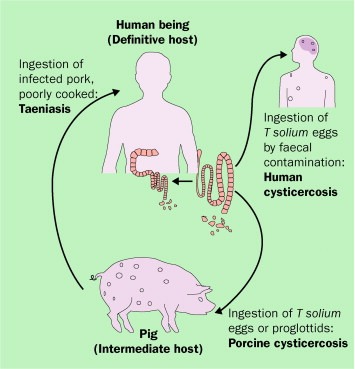Published on
updated on
Reading 2 min.
On X, an emergency doctor shared the shocking image of a patient’s legs. They are infested with parasites following the consumption of undercooked pork. Explanations.
A picture is worth a thousand words. On X (ex-Twitter) on August 25, a doctor posted the most astonishing scan he has ever seen: that of a man whose legs are literally filled with parasites. The CT scan used shows dozens of larvae embedded in the muscles of a patient. And the image is not a montage!
An extreme parasitic infection called cysticercosis
As surprised as we were, emergency physician Dr. Sam Ghali nevertheless provided a medical explanation… which sends shivers down your spine.
The troubling diagnosis is due to a parasite called “cysticercosis,” an infection caused by the parasite’s larvae. Taenia soliumalso known outside the medical community as the “pork tapeworm.” The doctor then tries to decipher its life cycle and infection.
Humans are infected by T. Solium by ingesting cysts found in undercooked pork. After several weeks (usually 5 to 12), these cysts develop in the gastrointestinal tract into mature adult tapeworms (intestinal taeniasis). These adult tapeworms then lay eggs which are in turn excreted in human feces.It is very important to note that it is only when these eggs are ingested through fecal-oral transmission that one can develop the clinical syndrome known as cysticercosis!” ithe doctor tells me.

Once the eggs are ingested (human or pig), they release larvae that penetrate the intestinal wall and invade the bloodstream and from there can spread literally anywhere throughout the body.”The brain, eyes, subcutaneous tissues, and skeletal muscles are the most common destinations. The larvae lodge wherever they end up and eventually form cysts called cysticerci.” emphasizes the emergency doctor.
Usually benign, but sometimes fatal
Behind the unsavoury side of the medical case, the expert nevertheless specifies that the inflammatory response of the host generally ends up killing the cysts, “which then undergo calcification, giving them the classic appearance you can appreciate on this scan”.
But sometimes the infection can be dramatic and fatal.”What can be really serious is when the larvae eventually travel up to the brain and form cysts in the brain tissue itself. This specific condition is known as neurocysticercosis. It can cause headaches, confusion, convulsions and other serious neurological problems. The prognosis for cysticercosis is generally good, but unfortunately, some cases are fatal.” Treatment options include antiparasitic therapy, steroids, antiepileptics (neurocysticercosis), and surgical removal.
According to the World Health Organization (WHO), approximately 2.8 million people are suspected of being infected with Taenia solium each year worldwide. The total number of people suffering from neurocysticercosis (NCC) is estimated each year at “between 2.56 and 8.30 million“.
How to protect yourself from parasites
If you too are horrified by the possibility of serving as a home for a hundred larvae, the doctor reminds us: the best advice to avoid the Taenia solium is still the simplest. Stay clean, wash your hands regularly, and above all, never eat raw or undercooked pork.
